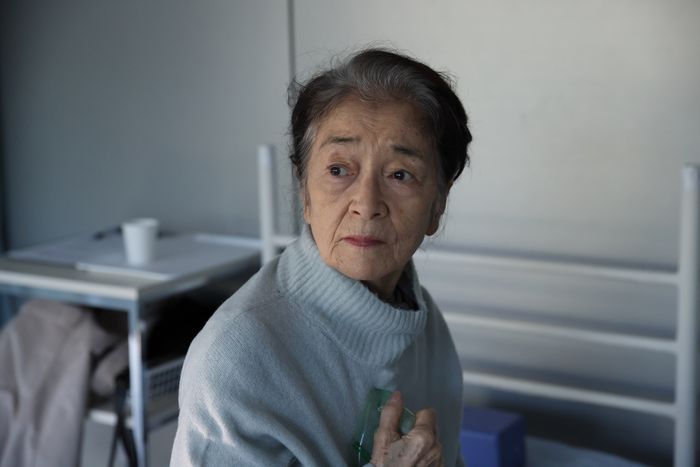
One of the best things about Cannes is the chance it affords attendees to see something completely surprising and beautiful from a burgeoning talent. That’s what happened today at the Debussy premiere of Chie Hayakawa’s Plan 75, the Japanese filmmaker’s quietly devastating feature debut. (In 2014, her student film Niagara was selected by the Cannes Cinéfondation.) Before the film started, Hayakawa took the stage with her stars and admitted that her “heart [was] beating so loud” in anticipation of the audience’s reaction. She said she’d been working on the film for years, referring to its inception as a short in 2018 with the same title, part of an anthology called Ten Years Japan. By the end of the film, much of the audience (including me) was in tears and on their feet.
Plan 75 begins with a violent (and literal) bang but unfolds with chilling subtlety from there. It’s a plaintive wail that sneaks up on you, with its minimal dialogue and gentle poetic realism that makes its near-future dystopia feel just like our present, complete with government-sponsored health-service tents lining the streets. The film takes place in a version of Japan where, faced with a rapidly aging population that’s “draining financial resources,” the government decides to offer everyone over the age of 75 the option (not required, but strongly suggested) to be euthanized, free of charge. Diegetic news reports explain that the policy is “controversial” but mostly accepted by a culture that has a “history of sacrifice” and comes on the heels of “elderly attacks” throughout the country — another bleak echo of our present moment.
The film follows three main characters: Michi (Chieko Baishô), a graceful, proud 78-year-old hotel maid who leads an unremarkable but independent life shot through with moments of happiness — karaoke with her friends, sliced apples in the break room — before she’s let go from her job and falls into a deep loneliness; Hiromu (Hayato Isomura), a young Plan 75 recruitment agent who slowly realizes the innate horror of what he’s doing once he comes into contact with his elderly uncle; and Maria (Stefanie Arianna Akashi), a Filipino woman who begins the film as a caregiver for senior citizens but whose daughter’s dwindling health forces her to take a higher-paying position at Plan 75.
Hayakawa presents each of her characters’ lives and surrounding realities without any sci-fi (à la Logan’s Run), horror (à la Midsommar), or melodramatic frills (à la Never Let Me Go), and the movie is better for it — the concept is wrenching enough on its own. And while it very clearly aims its pointed social critiques at our current culture of individualism and detachment in the face of total government abandonment, it’s not preachy. That doesn’t mean it won’t leave you feeling soul-sick (I’m still nauseated hours later). Before the festival, Hayakawa told THR that she was inspired to make the film after returning to Tokyo from New York and feeling shocked by “how intolerant Japan had become … There was this new idea of ‘self-responsibility’ that was being talked about everywhere, and the implication seemed to be that the marginalized should find a way to fend for themselves.”
Specifically, Hayakawa says she was moved to write the film after Tokyo’s 2016 Sagamihara stabbings, where a young man killed 19 people at a care home for disabled people and said he was trying to “ease the burden” on their families: “I was enraged and thought, if Japan were to accelerate down this path of intolerance, what would it look like?” Plan 75 returns to the idea of the elderly as a burden many times; Michi and her friends discuss their euthanasia plans cheerfully, as a way to ensure a better future for their grandchildren, and Michi slowly comes to terms with her fate as she realizes that the social system isn’t set up to help her survive. But later in the film, when Michi illegally befriends the young Plan 75 agent who’s been hired to convince her to die, it’s clear that she and the young woman both need and benefit from each other’s company — that the policy and its implications about the economic value of human life are deeply harmful, not just for senior citizens but a horrible detriment to society at large.
If this all sounds wildly depressing — well, yes. Later scenes go so far as to evoke the Holocaust, with Maria sorting through and reluctantly pocketing the recently euthanized’s belongings in front of a wall of discarded shoes. But Plan 75 is also a movie about the small, delicate moments that punctuate life and give it meaning: splurging on the good sushi, cracking open a window at work to stare at a great view, sleeping over on a friend’s futon. Hayakawa wants to remind us of our humanity, our need for collectivity and community, and to stop us from allowing our political leaders to reduce us to a number on a spreadsheet. Or as she put it in Cannes press notes, “The beauty and dignity of human life.”


